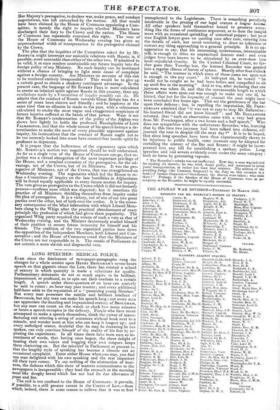LONG SPEECHES: MEDICAL POLICE.
EVER since the fabricators of newspaper-paragraphs rung the changes for a whole session upon HENRY BROUGHAM'S seven-hours speech on that gigantic abuse the Law, there has existed a school of oratory in which quantity is made a substitute for quality. Parliamentary debutants do not so much aspire to be brilliant, impassioned, or profound, as to spin out their orations to a certain length. A speech under three-quarters of an hour can scarcely be said to count ; an hour may pass muster; and every additional half-hour adds to the reputation of a " promising young Member." Not every man possesses the subtile and brilliant intellect of BROUGHAM, but any man can make his speech long ; not every man can appreciate the dazzling and impassioned oratory of BROUGHAM, but any man can count on the watch or clock how many minutes or hours a speech occupies in the delivery. People who have never attempted to make a speech themselves, think the power of manu- facturing and uttering a string of sentences without book next to a miracle, and wonder most at him who can keep it longest up ; and every unfledged orator, doubtful that he may be dreaming he has spoken, can only convince himself of the reality of his feat by re- peating the experiment. In all times there have been men so in- continent of words, that having once begun, the sheer delight of hearing their own voices and wagging their own tongues keeps them chattering on. But the mischief in Parliament at present is, that the lengthy style of speaking has become a chronic not an occasional complaint. Enter either House when you may, you find one man delighted with his own speaking and the rest impatient till their turn comes. To say nothing of the obstruction of busi- ness, the dulness which this state of matters communicates to the newspapers is inexpressible : they load the stomach at the morning meal like doughy bread which has not had its due allowance of yeast and fire.
The evil is not confined to the House of Commons : it prevails, if possible, to a still greater extent in the Courts of Law,—from which, indeed, there is some reason to believe that it was at first
transplanted to the Legislature. There is something peculiarly intolerable in the prosing of our legal orators a longue haleine. All other speakers hold themselves bound to preserve some- thing like the forms of continuous argument, or to dust the insipid mess with an occasional sprinkling of oratorical pepper ; but your true English lawyer goes on quoting case after case, entering into the details of each, but never venturing to draw an inference or extract any thing approaching to a general principle. It is no ex- aggeration to say, that his unmeaning, monotonous, interminable talk, is enough to drive an unpractised listener mad : and even judges have been known to be stimulated by an over-dose into most unjudicial vivacity. In the Central Criminal Court, no fur- ther gone than Tuesday last, the learned Recorder was goaded into a regular climax of bursts of spleen. Shortly after four o'clock he said, "The manner in which some of these cases are spun out is enough to tire any court." At half-past six, he vowed "he would not be caught as he had been before and compelled to sit up until five in the morning." And at ten, after declaring that one juryman was taken ill, and that the unreasonable length to which those affairs were spun out was enough to make any one ill, he hinted, that but for the loquacity of counsel the case might been concluded five hours ago. This set the gentlemen of the bar upon their defence ; but, in repelling the imputation, Mr. PREN- DERGAST admitted that "it was not so easy to stop Mr. Ballantine ; his learned friend did not know himself" : and Mr. BALLA/curls retorted, that " such an observation came with a very bad grace from Mr. Prendergast, after a two hours and a half speech." Who does not sympathize with the unfortunate Recorder, who, learning that by this time two jurymen had been talked into sickness, ad- journed the case in despair till the next day ?'" It is to be hoped, that since long speeches have been thus experimentally shown to be injurious to public health, some measure may be adopted for curtailing the oratory of the Bar and Senate : it might be incor- porated into any bill for establishing a sanitary police. Long speeches and bad sewers evidently come under the same category : both do harm by generating vapours.
` The Recorder's rebuke was not ineffectual. Next day, a man was indicted for stealing six shovels; he was tried, found guilty, and sentenced to seven years' transportation, in rather less than four minutes. The address of the presiding Judge (the Common Sergeant) to the Jury on this occasion is a model of laconic eloquence—" Gentlemen, the shovels were taken ; who stole them ? " Perhaps, if the Speaker of the House of Commons were as pe- remptory as the -Recorder, he might be equally successful.


























 Previous page
Previous page